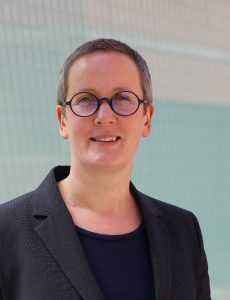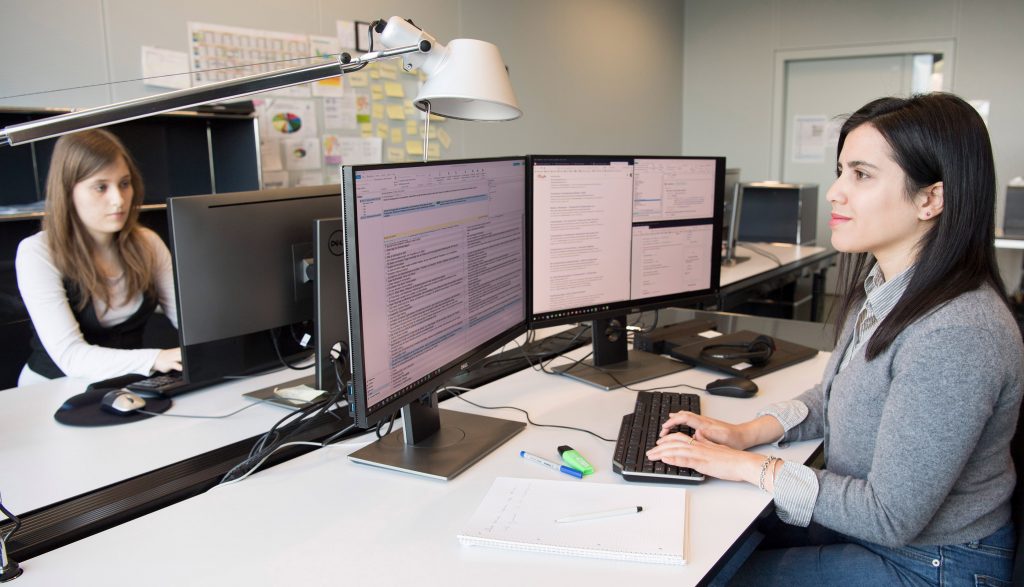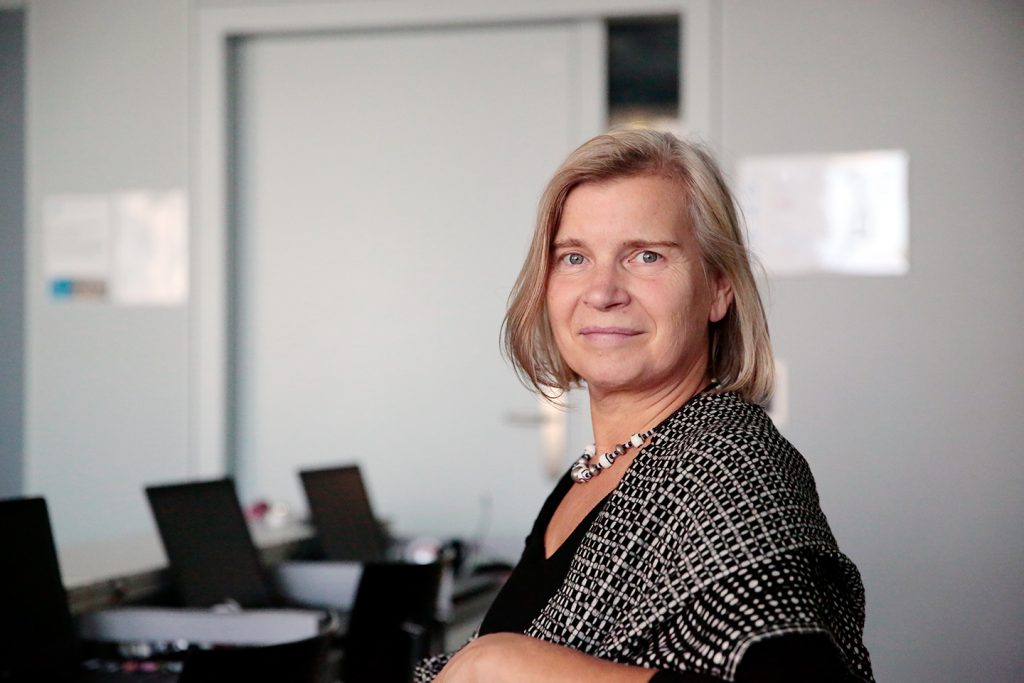The advent of ChatGPT has led to hysterical media headlines proclaiming that generative AI will eradicate the need for jobs that work with languages. While it is true that technology is radically changing the face of the profession, language professionals are still very much in demand. Multilingual Switzerland in particular is facing a shortage of labour in the field.
It’s not easy, as the head of a Swiss institute that trains multilingual communication professionals, to be confronted on an almost daily basis with click-bait media headlines screaming that no-one in the world will ever need to learn languages again and that the professions of translator and interpreter are, to quote the infamous British comedy team Monty Python, as dead as a parrot. Strangely, these hysterical headlines have all appeared in the wake of ChatGPT, whereas in truth translators – those are the language professionals who work with written texts – have been quietly getting along nicely with the machine since at least 2017, when the translation tool DeepL appeared.

How translators work today
Most professional translators are now also post-editors. Translators feed their text through the machine, which translates it for them, and then the human translator edits the machine’s output. Translators post-edit because the machine’s output is not perfect. The machine doesn’t have real-world context. Nor does it have a tremendous sense of style. Translations will ultimately be read and used by human beings and they need to be looked at by human beings to make sure they’re fit for purpose. This kind of editing is a highly skilled task.
DeepL Translate is a specialised tool, of course, and is used only for translating. ChatGPT, on the other hand, does lots of different things and is for everybody, not just language professionals or people who need a quick translation. ChatGPT is exciting, it’s frightening, it’s a game-changer. That is why journalists are writing provocative headlines proclaiming the end of the world as we know it. But what goes for DeepL goes for ChatGPT: we still need humans who know how to harness the power of these shiny new tools. Translators, as it happens, already have much more experience with this than most people.
Language service providers in Switzerland
The leading global language industry intelligence service, Slator, happens to be based in Switzerland. Although “compiling a list of Swiss language service providers (LSPs) is no easy task” because of the way the central Swiss business registry functions, Slator has identified 250 Swiss companies whose officially listed business purpose is “translation services”. These range from one large language service provider (STAR Group) to mid-sized players such as Supertext and Textshuttle (who have just announced their merger), to 70 boutique LSPs and around 150 small ones, not to mention the freelance linguists represented by the professional organisations ASTTI (400 members) and DÜV (250 members).
The fact is, though, that the language industry is actually a global industry, with an estimated revenue in 2022 of somewhere between 25 and 60 billion euros (figures courtesy of Slator and Nimdzi). Take a look at the jobs on Slator’s affiliated careers website LocJobs and you will see that the majority of the vacancies are labelled “remote” or “hybrid”. The LSPs who are advertising these positions are based as far apart as the USA and the Benelux countries … and Switzerland.
The Swiss federal government: a key source of employment
Language service providers aside, Switzerland offers another key source of employment for language professionals: the federal government. Translators are needed by the Sprachdienste der Bundesverwaltung and interpreters are needed by the Swiss parliament and by State Secretariats such as SEM. The Sprachdienste der Bundesverwaltung are concerned that they will be unable to replace the significant number of their translators who are due to retire in the next few years. They are so concerned, in fact, that they have formed a recruitment working group to address the problem. The government needs linguists
- who speak some or all of the Swiss national languages,
- who have a really good grasp of “Swissness”, i.e. a familiarity with the Swiss system of government and way of doing things, and
- who have an excellent grasp of their mother tongue.
It is proving challenging to find enough university graduates with this skill set, and nothing less than the future of Swiss multilingualism is at stake. Adrian Wymann, head of the terminology section at the Federal Chancellery says, “The federal government serves a multilingual population … If we don’t have enough qualified translators to ensure the dissemination and accessibility of written materials across the various languages and cultures of Switzerland, then the cohesiveness of the nation is under threat. Translators are essential to a multilingual Switzerland – now and in the future.”
Swiss language professionals in the EU institutions
The European Union is another key employer of Swiss language professionals, particularly interpreters. Conference interpreters are the classical pianists of the language professions: it takes a certain kind of person to deliver a virtuoso performance in a high-stakes environment – and it costs an appropriately high amount to train these experts. Numerous graduates of the ZHAW Institute of Translation and Interpreting’s Masters pathway in Conference Interpreting have gone on to work as interpreters at the EU. Among the qualities the Directorate General for Logistics and Interpretation for Conferences looks for in interpreters are
- empathy,
- cultural understanding,
- emotional intelligence,
- technical skills,
- the ability to build trust and
- to work in the extremely complex environments that make up the EU institutions.
Technical skills aside, all of these qualities are innately, deeply human.
“An increased need for specialisation”
The 2024 European Language Industry Survey found that the language industry has become more diverse in terms of the types of roles it offers. For this reason specialisation is becoming more and more important. It is certainly the case that the world of language professionals is no longer made up of simply translators and conference interpreters. As the machine has stepped in, roles for linguists have multiplied and diversified. The forthcoming Handbook of the Language Industry names the following contemporary roles:
- translators and interpreters in medical and health settings,
- heritage tourism translators,
- audiovisual translation and media accessibility specialists,
- transcreators,
- machine translation and language technology developers,
- distance interpreters,
- multilingual project and process managers,
- terminologists,
- revisers,
- video game localisers, and
- humanitarian responders.
And this is not an exhaustive list.
Are there still jobs with languages in Switzerland?
There are jobs for language professionals, lots of them. Well-paid jobs where you can work from home in Switzerland or relocate across the world. And multilingualism in Switzerland is going nowhere. The federal government will always need top-quality linguists to ensure that direct democracy functions well in four languages.
The current journalistic hysteria about the end of the language professions has a fundamental misconception at its root. This misconception stems from the notion that translators and interpreters were only ever walking dictionaries. And now that we have much better AI-powered dictionaries at our disposal, there is an assumption that we no longer need the less efficient human variety. But language professionals were never ever only walking dictionaries. They have always been and will remain highly skilled intercultural and multilingual communicators. Which is good news, because ChatGPT, DeepL & Co. are incredibly sophisticated tools.
To use these tools well – properly, proficiently – will take expertise. It will take professionals who are trained to operate these tools correctly and who can assess the quality and appropriateness of the decisions that the machine makes. This is what we are training our students for. And with the advent of AI tools, the world will need their expertise more than it ever has before.

The IUED Institute of Translation and Interpreting is the ZHAW competence centre for multilingualism and language mediation. It is actively engaged in conducting research, offering degree programmes and continuing education courses, and in providing services and consulting in these fields.
The BA in Multilingual Communication and the specialisations in Multilingual Communication Management (former: Professional Translation) and Conference Interpreting within the MA in Language and Communication are practice-oriented degree programmes for the communication experts of tomorrow.




